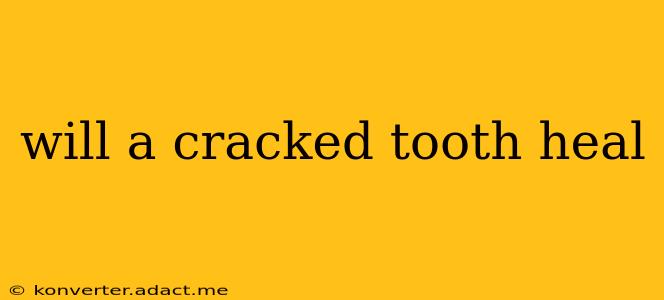A cracked tooth, unfortunately, won't heal itself. Unlike a bone fracture that can mend with time and proper care, the hard enamel and dentin of a tooth lack the regenerative capabilities to repair a crack. This means that once a tooth is cracked, professional intervention is crucial to prevent further damage and potential tooth loss. The severity of the crack will determine the necessary treatment.
What are the different types of cracked teeth?
Understanding the different types of cracked teeth is essential to grasping the treatment options. There are several classifications, including:
- Fractured cusp: This involves a small chip or break off the biting surface (cusp) of a tooth. Often, this is the least serious type of crack.
- Craze lines: These are tiny, barely noticeable cracks that don't extend deep into the tooth and generally cause no symptoms or problems.
- Cracked tooth: This is a crack that extends from the chewing surface down toward the root. These cracks can be very painful and often require treatment to prevent further damage.
- Split tooth: This describes a tooth that's split vertically into two parts.
- Vertical root fracture: This type of crack extends from the root of the tooth up towards the crown. It's usually hard to diagnose and can lead to tooth loss.
What are the symptoms of a cracked tooth?
Recognizing the symptoms of a cracked tooth is critical for prompt treatment. Common signs include:
- Sharp, shooting pain: This pain is often triggered by chewing or biting down on something.
- Sensitivity to temperature: Hot or cold foods and drinks may cause intense pain.
- Pain when releasing pressure: The pain might subside when the biting force is removed.
- Lingering pain: The pain may persist even after the initial trigger is gone.
- Swelling or tenderness: In severe cases, you may experience swelling around the affected tooth.
- Appearance of a crack: In some cases, you can visually see the crack on the tooth's surface.
Can a cracked tooth be treated without a root canal?
The need for a root canal depends on the severity and location of the crack. Minor cracks, particularly fractured cusps, might be treated with a filling or bonding to restore the tooth's integrity. However, cracks that extend deep into the tooth, reaching the pulp (the inner part of the tooth containing nerves and blood vessels), typically require root canal therapy. This procedure involves removing the infected pulp, cleaning and disinfecting the canals, and filling them to prevent further infection. A crown is typically placed afterward to protect the weakened tooth.
How can I prevent cracked teeth?
Preventing cracked teeth involves taking proactive steps:
- Avoid biting hard objects: Refrain from using your teeth as tools for opening packages or bottles.
- Wear a mouthguard: If you play contact sports or grind your teeth (bruxism), a mouthguard can offer protection.
- Maintain good oral hygiene: Regular brushing, flossing, and dental check-ups are crucial for maintaining overall oral health.
What happens if a cracked tooth is left untreated?
Leaving a cracked tooth untreated can lead to several serious complications, including:
- Severe pain and infection: The crack can allow bacteria to reach the tooth's pulp, causing infection and potentially an abscess.
- Tooth loss: In severe cases, the crack can cause the tooth to split or break completely, resulting in tooth loss.
- Spread of infection: If left untreated, the infection can spread to adjacent teeth or even the jawbone.
When should I see a dentist about a cracked tooth?
If you suspect you have a cracked tooth, it's crucial to seek professional dental care immediately. Early diagnosis and treatment can often save the tooth and prevent further complications. Delaying treatment can significantly worsen the situation and increase the likelihood of tooth extraction.
This information is for general knowledge and does not constitute medical advice. Always consult with a qualified dentist for diagnosis and treatment of any dental problems. They can perform a thorough examination and determine the best course of action based on the specifics of your situation.
